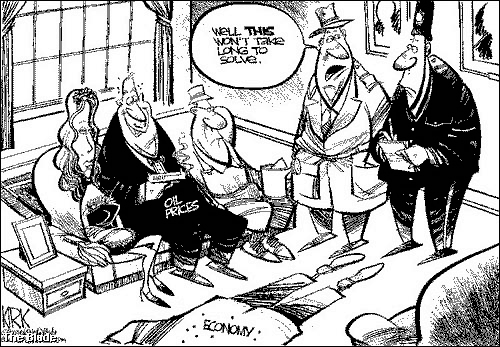|
BUSH BASHING |
|
BUSH ECONOMIC POLICY, ANALYZED--New Republic
Manservant This
argument betrays a common misunderstanding of the precise nature of the president's right-wingery. Bush's extremism does not
lie in the purity of his devotion to the teachings of Milton Friedman but rather in the slavishness of his fealty to K Street.
The distinction is a fine one, but it's highly revealing. In most instances, being pro-free market and pro-business amount
to the same thing. Businesses usually want the government out of their way, which is why the business lobby threw its weight
behind Bush's efforts to cut taxes, scuttle workplace safety standards, and so on. The way you tell the difference between
a free-marketer and a servant of business is how he behaves when the interests of the two diverge. And all the evidence, including
the Medicare and energy bills, points to the conclusion that Bush is happy to throw free-market conservatism out the window
when business interests so desire. Consider,
for instance, the $180 billion farm bill signed by Bush in 2002. The notion that taxpayers should subsidize farmers rather
than, say, butchers or t - shirt salesmen represents the most archaic and unjustifiable kind of
government intervention. But farmers have lots of clout in Washington, in part because they're relatively affluent (farm households
earn more on average than non-farm households) but mainly due to the disproportionate representation of rural states in the
Senate and electoral college. In the course of showering federal largesse upon farmers a year ago, some senators tried to
mitigate their shame slightly by limiting payments to $275,000 per farmer. Republicans removed this modest measure. Bush also
capitulated to the textile and steel industries by imposing tariffs on competing imports, overruling the advice of his economic
advisers. (Only after steel-consuming industries complained and the World Trade Organization ruled the tariffs illegal did
Bush finally relent.) A
cornerstone of Bush's domestic policy is his aptitude for economic giveaways that are supported by neither liberals nor true
conservatives--indeed, that are supported only by those who profit from them monetarily or politically. Take the energy bill,
which lavished subsidies upon favored industries. Not only did environmentalists and mainstream liberal economists denounce
it, so did conservative scholars at think tanks like the Heritage Foundation and the Cato Institute. Everything you need to
know about the politics and policy of the energy bill is contained within one sentence that appeared in The Washington
Post last month: "The assembled lobbyists--representing farm, corn, soybean, wind, geothermal, coal, oil and gas interests
that benefit from provisions in the 1,100 page bill-- gave [GOP Senator and energy-bill champion Pete] Domenici a standing
ovation, and he thanked them for helping to push the legislation to the brink of passage, according to one person present."
Similarly,
the Medicare bill, supposedly evidence of Bush's moderation, is in fact typical of his domestic agenda, which revolves around
granting favors to powerful interest groups. Again, most of the major liberal and conservative think tanks opposed the bill.
But the pharmaceutical companies were ecstatic with it: Not only does it subsidize drug purchases, it specifically prohibits
the federal government from using its negotiating power to hold down the cost of the drugs it purchases. (Got that? Those
who spend your tax dollars are forbidden from striking a good bargain with the drug companies.) The American Medical
Association was brought on board with a promise to boost Medicare reimbursements. And employers received federal subsidies--more
than twice what they requested--to help cover the cost of their retirees' health care. As Thomas Scully, the Bush appointee
who heads the Centers for Medicare and Medicaid Services, put it, businesses received "way beyond their wildest requests"
and "should be having a giant ticker-tape parade." Perhaps deeming a ticker-tape parade unseemly, the Business Roundtable
and the U.S. Chamber of Commerce instead launched a lobbying campaign on the bill's behalf. Note
that all these measures would require the government to spend more money. But they triggered nary a complaint from conservatives.
What they hated about the Medicare bill was the part about helping senior citizens buy medicine. When the government gives
money to sick people, you see, that's incipient socialism. When it gives money to drug companies, doctors, and employers,
that's the free market in action. All
this is in keeping with the recent pattern of Republican governance. Last year, the Associated Press conducted a remarkable
study showing how federal spending patterns had changed since the GOP took over Congress in 1995. Republicans did not shrink
federal spending, it found, they merely transferred it, from poorer Democratic districts to wealthier Republican ones. This,
the A.P. reported, "translates into more business loans and farm subsidies, and fewer public housing grants and food stamps."
In 1995, Democratic districts received an average of $35 million more in federal largesse than Republican districts, which
seems roughly fair given that Democratic districts have more people in need of government aid. By 2001, the gap had not only
reversed, it had increased nearly twenty fold, with GOP districts receiving an average of $612 million more than Democratic
ones. Justifying this shift, then- Majority Leader Dick Armey said, "To the victor goes the spoils." It would be a worthy
slogan for Bush's reelection campaign. |
|
|
Enter supporting content here Politican is another dirty word!
Politican is another dirty word! |
